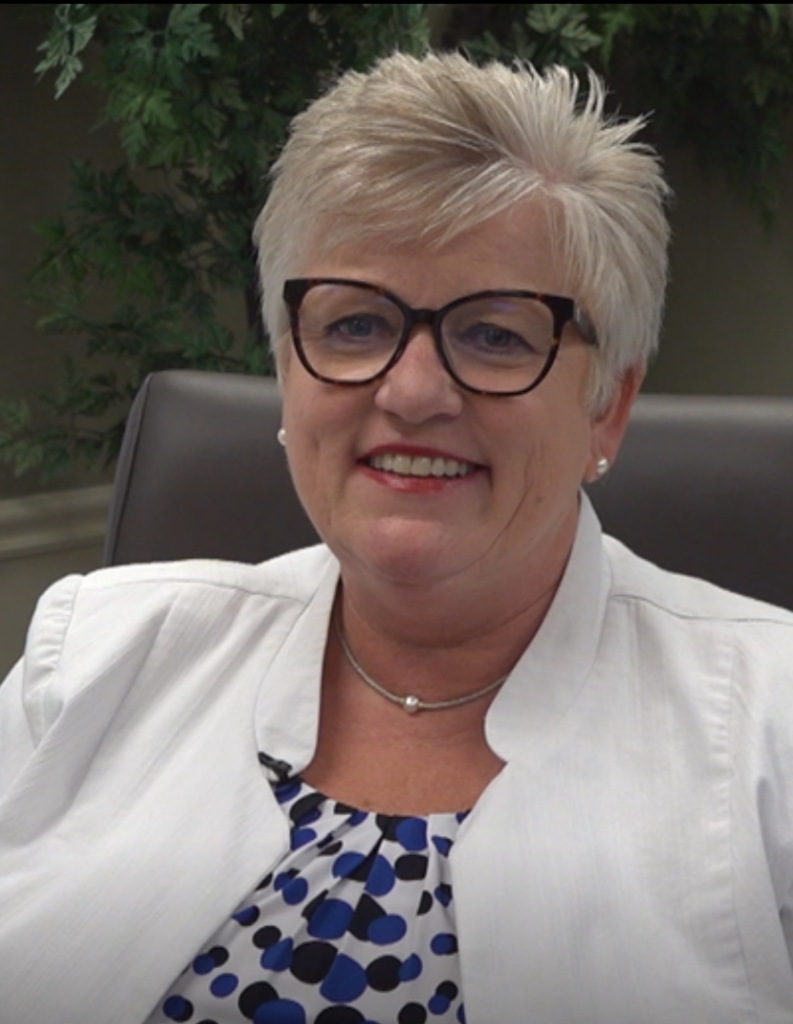Editor: Act Locally Waco is sharing a series of blog posts — Faith Doing Good — about local religious groups working in the community. These pieces were written by Baylor University students from the Department of Journalism, Public Relations, and New Media.
By Bella Vinson
St. Alban’s Episcopal Church started as a church plant in 1946 in Waco. Since the church opened its doors, the members have been able to develop decades-long partnerships with organizations in Waco, sharing a common humanity with others in the community.
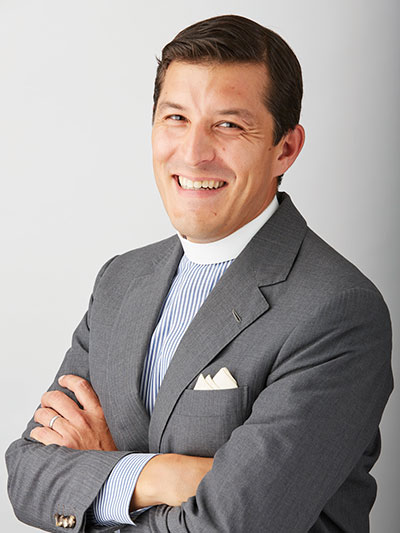
Rev. Aaron Zimmerman is the rector of St. Alban’s, serving the church for eight years.
When Zimmerman went to college he got involved in campus ministry. He enjoyed it, he said, but was still unsure if it was something he ultimately wanted to pursue.
“For two years after graduation, I went to Central Asia to teach English with a Christian organization,” Zimmerman said. “Part of it being I wanted to contribute in a meaningful way, but also part of it I wanted to test whether ministry was something I wanted to do.”
Zimmerman said he loved it, which ultimately led him to decide that he wanted to serve others in a path of ministry.
“I wanted to give my life in some way that could help other people as they are asking those questions. Not to say I have all the answers, but I know someone who does,” Zimmerman said. “So my ministry is mostly just to point to him.”
St. Alban’s partners with a number of public and private schools throughout the Waco area. The church has a long history of connections within the education community in Waco, as many of the members are teachers. They have been working with Cedar Ridge Elementary for over 10 years.
“We have done everything from people going to read to students there and tutoring them,” Zimmerman said. “The thing we do the most is providing meals when they have big open houses, meet the teacher nights, things they want to get a lot of the families to. We make dinner here at the church and take it to the school and serve it there.”
St. Alban’s also does work with reVision, sending mentors for incarcerated teenagers in the Mart facility. They also partner with Mission Waco. Members lead monthly devotionals at their homeless shelter, and collect toys for them during Christmas time.
Although it is not an expressed ministry of the church, St. Alban’s partners with Alcoholics Anonymous and other 12-step groups by providing a space for them to meet in the church’s Community Outreach Center.
“That is a place where lives get transformed and healed,” Zimmerman said. “We have had groups here four to five nights a week, sometimes around 70 to 80 people. Just a really strong community of folks on the path to hopefully find recovery.”
The church’s community outreach continues, even during times of crisis. During the winter storm that hit Waco in February, the church opened as a warming center for those who were affected and in need. They had over 50 volunteers assist that entire week by cooking meals and spending time with the people who came in.
“It was really meaningful to see our members build relationships with those people who were here, some still ongoing, and recognize our shared common humanity,” Zimmerman said.
St. Alban’s main mission is to share time and resources to serve the physical and spiritual needs of individuals and communities. Zimmerman reflected on the values of the church’s mission being displayed by members work in the community.
“One of the most rewarding things for me is when people realize the humanity of those they are helping,” Zimmerman said. “It’s not someone down here, some sort of nameless face, giving handouts. We are both fellow humans, we stand at the same level, although we’ve had different experiences.”
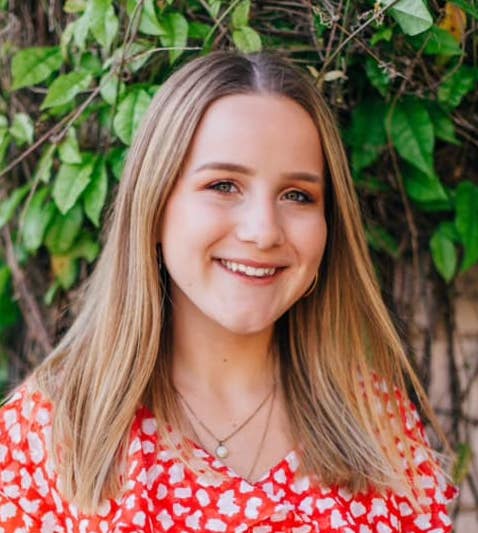
Bella Vinson is a Baylor sophomore from Waco.
The Act Locally Waco blog publishes posts with a connection to these aspirations for Waco. If you are interested in writing for the Act Locally Waco Blog, please email Ferrell Foster at [email protected].
Meraki Medical Associates LLP will begin offering COVID-19 vaccinations Friday, Aug. 20, at 1001 Dunbar Street in East Waco. The opening is planned in conjunction with August being National Immunization Awareness Month.
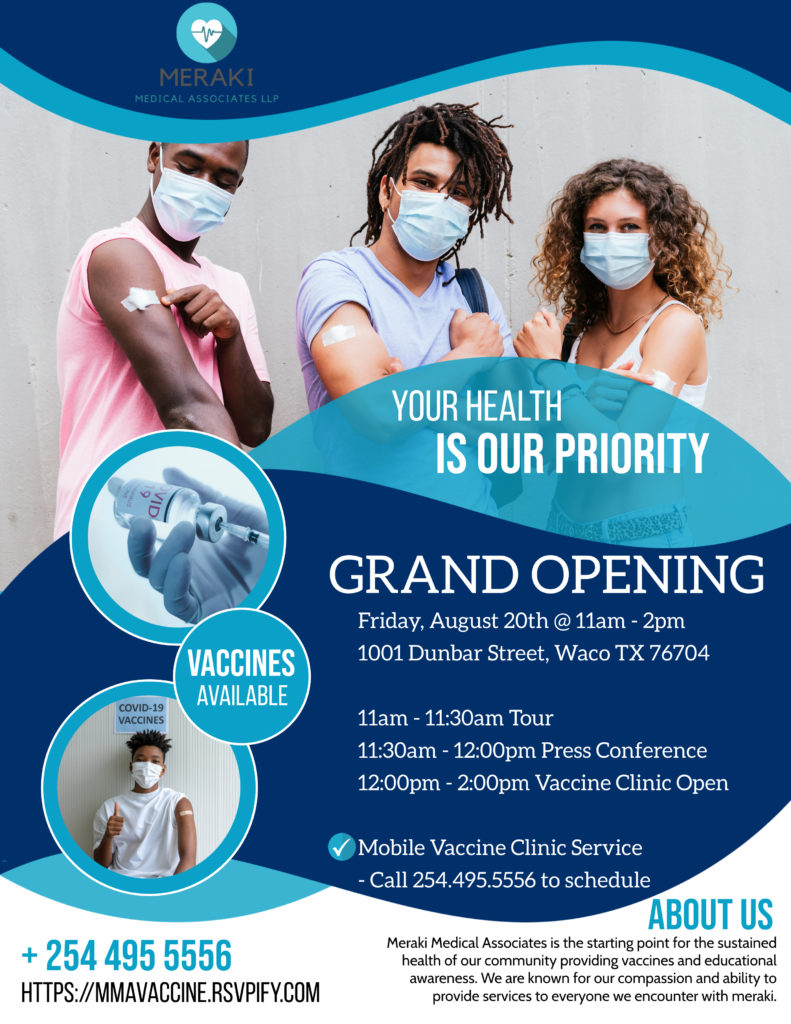
CEO Sophia Strother formed Meraki “to create access and awareness for communities of color in the East Waco,” she said. Meraki is Greek for doing something with soul, creativity, and love. “It’s important to always put something of yourself into what you’re doing, whatever it may be. We are a starting point for the sustained health of our community. We will be known for our compassion and ability to provide services to everyone we encounter with meraki.”
Strother is passionate about helping communities of color fight against COVID. After having over 10 family members directly affected by the virus, she decided she needed to take action. Partnering with Living Word Church of God in Christ, Meraki is set to open its clinic Aug. 20 to provide community-focused health awareness on the importance of vaccine-preventable diseases. It will provide vaccination clinics and educational opportunities statewide that will target underserved communities and special populations.
Meraki is at 1001 Dunbar St., Waco. This building has housed Living Word Church of God in Christ, Meals on Wheels, and Community Food Pantry for all of 20 years. Meraki believes “every person deserves an opportunity to be given a health experience that inspires them and enhances their quality of life. The team hopes to partner with other faith-based organizations, community organizations and corporations to administer vaccinations to individuals 16 years and older.” Sophia is passionate about helping others through faith, knowledge, and resources.
Aug. 20 Events at Meraki
11 a.m. – 11:30 a.m. – Tour
11:30am – noon – Press Conference
Noon – 2 p.m. – Vaccination Clinic
Strother also owns a logistics company and was recently featured on HGTV’s “40 Year Old Property Virgin.” Connect with Sophia online here.
The Act Locally Waco blog publishes posts with a connection to these aspirations for Waco. If you are interested in writing for the Act Locally Waco Blog, please email Ferrell Foster at [email protected].
Residents of Waco will be able to enroll in the Transportation Security Administration’s popular TSA PreCheck program at Waco Regional Airport Aug. 16-20.
The airport is a convenient location to sign up for the program that enables enrolled travelers to
“Travel with Ease” by experiencing an expedited security screening process. The “pop-up”
office will be located inside the lobby of the terminal building in the baggage claim area.
The application process allows U.S. citizens and lawful permanent residents to enroll directly
in TSA PreCheck – an expedited screening program that allows travelers to leave on their
shoes, light outerwear, and belt, keep their laptop in its case and their 3-1-1 compliant
liquids/gels bag in a carry-on, in select TSA airport checkpoint screening lanes. More than 200
airports participate in TSA PreCheck program nationwide.
Visit the Transportation Security Administration TSA PreCheck® |website at
https://www.tsa.gov/precheck to register and schedule an appointment for the upcoming
enrollment event. Applicants must bring proof of identity and U.S. citizenship. This can either
be through a current U.S. passport, or driver’s license and a copy of their birth certificate. The
enrollment process must be completed in person at the enrollment location for the proper
paperwork and fingerprints to be collected.
The application fee is $85 and can be paid during the enrollment appointment with either a
credit card, money order, company check or certified/cashier’s check. Cash or personal checks
are not accepted.
After completing enrollment, successful applicants will receive a Known Traveler Number
(KTN) via U.S. mail within two weeks and is valid for five years. The enrollee should enter the
provided KTN in the “Known Traveler Number” field when booking airline reservations. The
KTN also can be added when booking reservations online via a participating airline website,
via phone call to the airline reservation center, or with the travel management company.
Additionally, the KTN can be entered in participating airline frequent flyer profiles as well.
By Cory Dickman
I met Thomas Ellis at church back in the Fall of 2006. I was a freshman at Baylor and had no idea that 13 years later, we were going to start Waco Axe Co., the city’s first axe-throwing venue. Thomas and I, along with fellow partners Cody Beeler and Jared Dauenhauer, embarked on this journey of entrepreneurship and axe throwing.
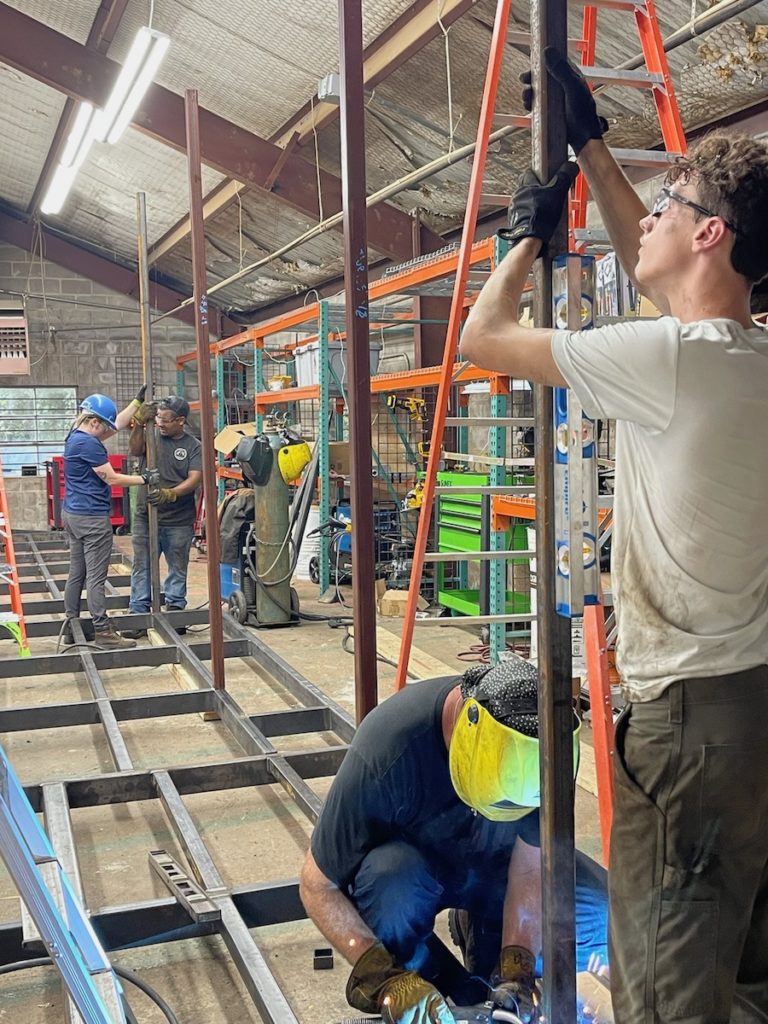
We leased a space on Washington Avenue and began the buildout of our venue, but when construction was taking longer than expected, we came up with an idea to build a mobile axe-throwing trailer. This would allow us to run events and tailgates, expand marketing, and most importantly, keep us busy during construction.
We approached Clay Springer and Triple Win Waco, a work-based learning apprenticeship program, about partnering with students to construct the trailer. The students would get paid for the hours they put in while earning valuable certifications along the way. Triple Win recruited students from Rapoport Academy and Connally Career Tech to join the project and after a build time of just three months, Waco’s first axe throwing-venue now had Waco’s first and only axe-throwing trailer.
The mobile axe trailer turned out to be a major success. We broke even on the project after four months of operation and just in time for our venue to open up on Feb. 14, 2020. Over the next 27 days, we experienced a lot of traffic from both local Wacoans and our tourist population. Then on the 28th day, the axes had to be put away as the Covid-19 pandemic began ramping up. For us, much like everyone else, the rest of 2020 was a blur. From a business perspective, we all lost employees, revenue, and a sense of time.
It wasn’t until Christmas break of 2020 that sales began to increase as people became more comfortable going out in public again. We were feeling (axe)cited and ready to hit (the mark) in 2021. One of our regulars, Gib Reynolds from Startup Waco, approached us regarding the Kiva program. Kiva is a nonprofit designed to help crowd source funding for entrepreneurs and allow the community to invest in businesses.
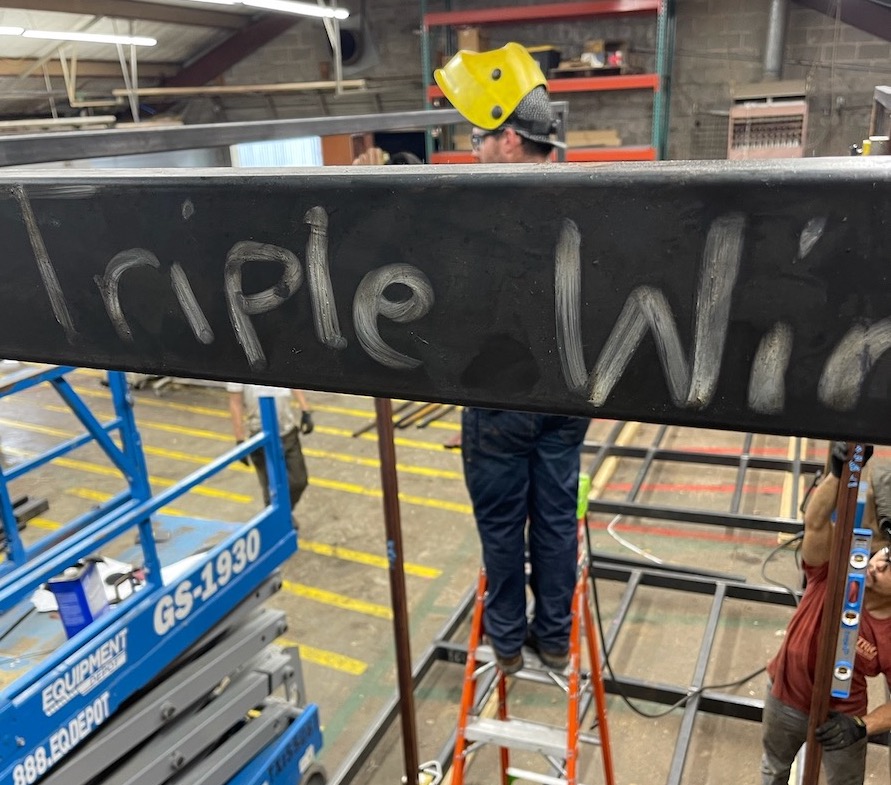
We applied for the program and were accepted up to $15,000. We decided to use those funds to build not one but two more axe trailers following the notable performance of the initial trailer. Because the experience working with Triple Win students was so positive and their team developed expertise on our product, we partnered with the organization again to complete our additional trailers. Triple Win had a new design in mind that would allow us to accommodate more people by having eight axe targets per trailer. The design was creative, innovative, and bigger (much bigger) than the first trailer.
Triple Win was awarded a Summer Career and Technical Education Grant, $30,000 of which was designated to Waco Axe as a project of value. Triple Win recruited an amazing team of students from Rapoport Academy including Azel Rodriguez, Mikayla Lee, Haven Roanke, Harris Cook, Devin Weaver, Caden Sullivan, and Rafi Pena. These students earned their OSHA 30 certifications and gained invaluable experience in welding, metalworking, computer-aided design (CAD), and soft skills like communicating with their employer. Not only do the students get to put together a cool project with their friends, they also see how their hard work directly impacts a local small business.
The basic goal of axe throwing is to get the axe to stick on the bullseye, but when you’re just learning, it can be the hardest skill to complete. There’s failure at first, but with hard work and determination, the axe will stick and the sense of accomplishment is unmatched. Taking an idea and creating a product from the ground up can feel like trying to get that axe to stick. But when we as a business partner with ambitious students who are eager to learn, we try, fail, and eventually get it right — together. Combine local students and a company that loves to serve the community and you get a Waco-born business that sticks.
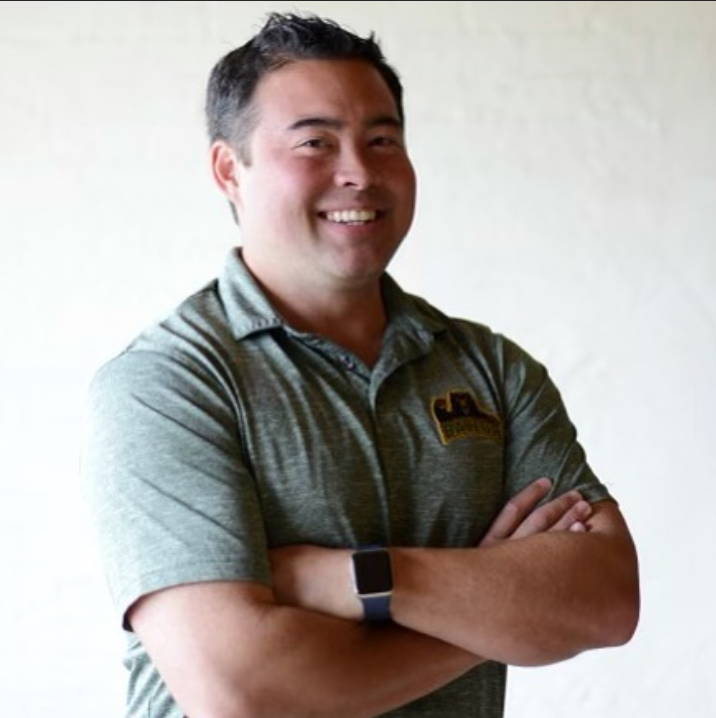
Cory Dickman is owner/founder of Rogue Capital, a company that invests in and supports entrepreneurs in their business ventures. He has founded or co-founded several businesses, including Rogue Media Network, Nexus E-sports, Waco Pedal Tours, Waco Escape Rooms, and Waco Axe. An Oregon Native, Cory originally moved to Waco to go to Baylor University. He moved back in 2015 to start the Waco Escape Rooms. Cory also serves on the Board of Act Locally Waco.
The Act Locally Waco blog publishes posts with a connection to these aspirations for Waco. If you are interested in writing for the Act Locally Waco Blog, please email Ferrell Foster at [email protected].
By Dan Worley
Christian Men’s Job Corps Waco will begin its next class at 6 p.m. Monday, Aug. 30, at The Hanger, 417 S. 17th St., Waco.
This will be our 35th class and like always, we need help. Following the format we used in the spring, we will meet two times a week (Mondays and Thursdays 6-9 p.m.). We will need meals for about 14 men per night. The CareCalendar we use for meal signups will be posted Wednesday, Aug. 11.

We call our mentors Champions, and they are welcome and needed every night you can possibly come. Built into every lesson is a time for Champions to interact with the men. I believe those of you who participated in the spring class will attest this worked well and gave you an opportunity to really get to know the guys.
Due to increases in COVID-19 cases in our area, we will once again ask everyone — participants, instructors, Champions, guests, and all to wear masks, keep an appropriate distance, and sanitize everything. We have masks, cleaning solutions, and hand sanitizer. This worked pretty well last class, and there is no reason it shouldn’t this time, too.
You can use to let men know the class is about to begin. One of the things about having class at The Hanger is that we attract men from outside of the shelters, which is something we like to see. So chances are someone in your family, your circle of friends, your church or those you work with knows a man who will benefit greatly by what we have to offer. Please share this with them. Invite them. Better yet, bring them. We will take any man 18 or older who wants to come to class and learn.
You may be asking, “Does this really work? Does anyone make a positive change because of CMJC?” The answer is, “Yes!” Three quick stories illustrate this. First, a few of our Board members were at a local business recently and the individual waiting on them was the daughter of a former graduate. Although he has since passed away, the daughter told these Board members that after graduation, the thing he was most proud of was completing this class. And the relationship the man had with his family was restored by putting to practice what he had learned.
Both the second and third “successes” happened in the midst of the pandemic when we were doing small, one-on-one sessions with two men. Neither of these men had held jobs in at least two years. Since going through CMJC, both are now employed, with good jobs that have benefits and a future. One has gotten married. Both men have done a 180 from where their lives were.
God can and will do a great thing in the lives of men who participate in CMJC Waco. Will you join Him in the work?
As always, if you have questions or concerns, call, text, or email me.
Dan Worley is executive director of Christian Men’s Job Corps Waco.
The Act Locally Waco blog publishes posts with a connection to these aspirations for Waco. If you are interested in writing for the Act Locally Waco Blog, please email Ferrell Foster at [email protected].
By Ferrell Foster
The murmur of the television filtered through the wall separating me from it, but another noise tickled my soul. My adult daughter, Tabitha, spoke over the TV voices. Music to the soul has a different rhythm and cadence than music for the ears; my daughter spoke to my soul because she was speaking to my mother’s ears.
My 92-year-old mother is virtually blind, seeing what I suspect are only hazy images. She can see enough to walk around our house with a little bit of guidance, but she cannot see the images on a television.
During Thursday night’s Dallas Cowboys football game, my mother sat with focused attention gazing at the TV. Every once in a while when the camera zoomed in on a helmet, she blurted out, “There’s the star,” but mostly she sat staring at the screen’s brightness.
In the midst of this, Tabitha provided the necessary play-by-play commentary so Mom would know what was going on. TV announcers speak with the assumption you can see the basics of what is happening; a blind person needs more.
Mom has been a Cowboys fan for about 57 years, almost as long as they have been a franchise. One year, about 1964, we attended the State Fair of Texas and the Cowboys were playing a game that day at the Cotton Bowl, which was inside the fairgrounds. Dad and I were able to beg Mom and my sister to go to the game with us.
The Cowboys were just becoming good; they were a long way from becoming America’s Team. But mother became a fan that day. We ended up attending virtually every home game, and we even met Don Meredith, a distant cousin, and his dad after one of the games.
Mother was and is a super fan. As a kid I would see my mother jump and scream and clap for the Cowboys as she would for nothing else. She still came close to jumping and screaming Thursday when she caught a glimpse of the now famous star on the helmets. She’s blind, but she still wants to “watch” Cowboys games.
So Tabitha gave Mom a great gift by telling her all that was happening in the game.
Virtually all of us need help with something, but we don’t always have someone to help us. There are needs throughout this community that are crying out for residents to help meet them. No one of us can help with all of those needs, but we can plug in to make a difference in one challenge.
Ashley Bean Thornton started Act Locally Waco to help residents enjoy Waco and get involved. We are still trying to do that. We share fun things, but we also tell other things that are happening so residents can get involved and make a difference.
If you see some community need on Act Locally Waco or elsewhere and your heart strings tug, get involved. If we all did one thing for others on a regular basis we would make a huge difference in the lives around us. And all of us need help with something either now or in the future.
It may not seem like a big deal to do the play-by-play for a blind person, but for a sightless person who cares about the Cowboys, it can mean the world. Little things can do that. And my daughter will always remember helping her grandmother enjoy the simple pleasures of “watching” a football game. Shoot, Tabitha, a Green Bay Packers fan, even used the “we” in talking about Mom’s team. Now that’s saying a lot, but little things matter.
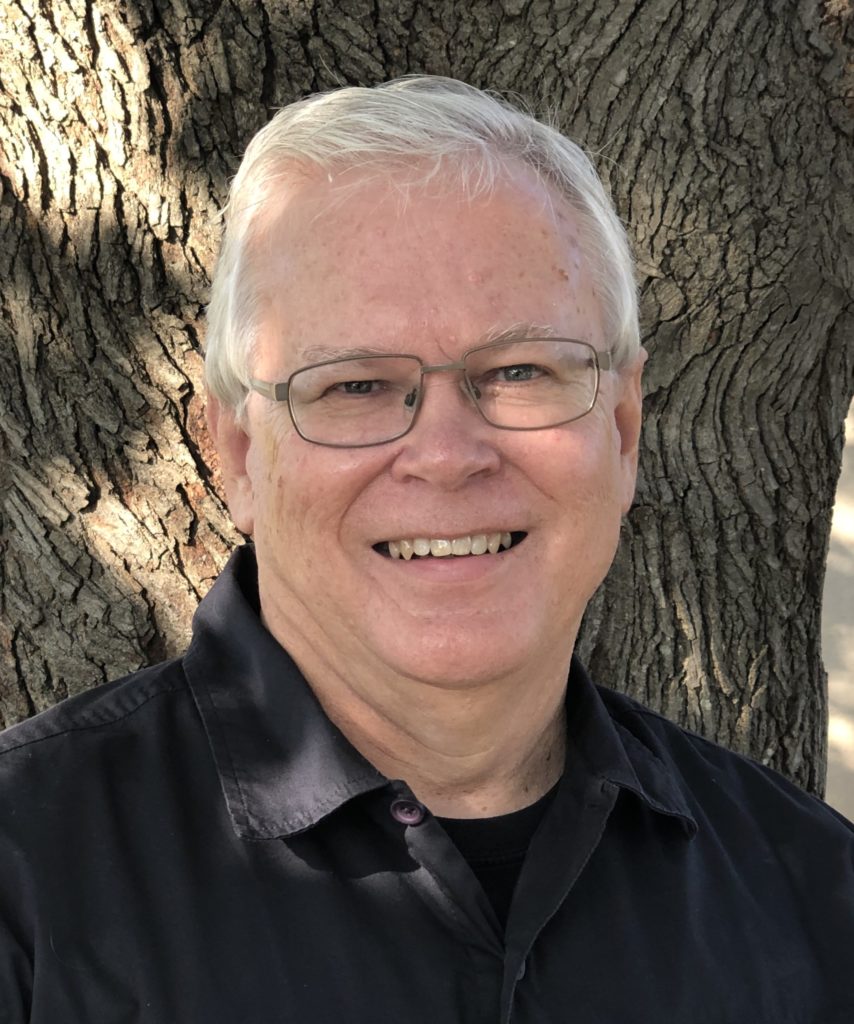
Ferrell Foster is acting executive director of Act Locally Waco and senior content specialist for care and communication with Prosper Waco.
The Act Locally Waco blog publishes posts with a connection to these aspirations for Waco. If you are interested in writing for the Act Locally Waco Blog, please email Ferrell Foster at [email protected].
By Suzii Paynter March
There is no avoiding a crisis; chaos can come in all sizes. Everyday good people are faced with unimaginable bad luck, disasters, break downs, unexplainable confusion, desperation and violence. But none of these should be the last word on anyone’s life.
The worst thing that happens to you should not define you. But all too often, a crisis and the chaos it brings, changes everything and every relationship in sight. What if every crisis ended up on your doorstep?
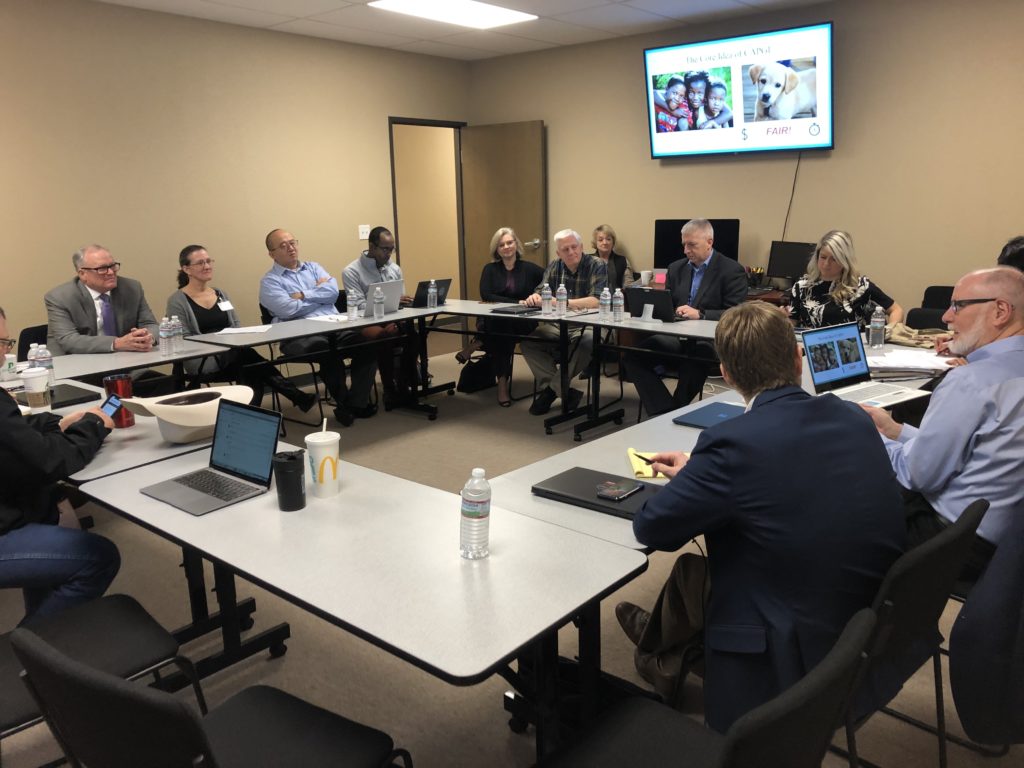
Waco needs a crisis hub. A crisis hub is a place that is a combined resource center that can help streamline decisions, bolster support, provide a smooth hand off, and share the load to help people in crisis avoid the chaos that can destroy themselves and their families.
Right now, mental health professionals, medical personnel, City of Waco, and McLennan County leaders are working toward building the right team to respond to overwhelming crises and build a place for Waco to have a crisis hub. Responding to the kinds of personal crises that can bring harm to self and others and finding the way out of chaos takes a team.
Through the leadership of the Prosper Waco working group, the Behavioral Health Leadership Team, the Board of MHMR, and the advice of other communities who have also tackled this problem, Waco is retooling to minimize the chaos that wreaks havoc on friends, family, and neighbors. Bringing existing resources together matters, and it multiplies the effectiveness of intervention.
The number of people in crisis and the intensity of the crises grow month by month. One frustrated man in crisis described Waco as a pinball machine – “I know I need help, but all I can do is bounce around town or be drunk or violent. Can’t somebody catch me on the bounce. I know I need help?”
Teams in a crisis hub can function together to avoid duplication of efforts; they can minimize missed opportunities and promote persistence; they can support each other in the very hard work of helping people climb out of chaos and find hope. A crisis hub team can find steps toward solutions JUST because they are together and can bring many talents to bear all at once. Concentrating services helps the person in crisis and it helps sustain the strength of the professionals working together, too.
When is the sum greater than its parts? When a small group of caring, talented people step in together to tackle chaos and come out the other side with hope. I would not know what to do if the crisis were on my doorstep, but I can be part of the solution by supporting the team that is building the Waco Crisis Hub.
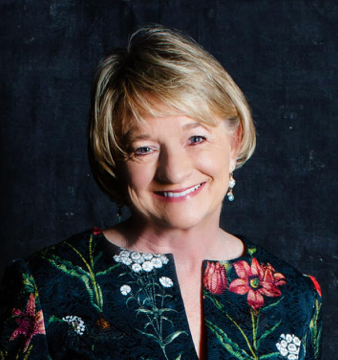
Suzii Paynter March is chief executive officer of Prosper Waco.
The Act Locally Waco blog publishes posts with a connection to these aspirations for Waco. If you are interested in writing for the Act Locally Waco Blog, please email Ferrell Foster at [email protected].
From the City of Waco Public Information Office
The Texas Historical Commission presented a THC Preservation Award of Merit to the First Street Cemetery Memorial Advisory Committee during the City of Waco Council Meeting Tuesday, Aug. 3.
The First Street Cemetery committee members Annette Jones (retired, City of Waco assistant city attorney), Nesta Anderson (archaeologist, principal investigator), and Melanie Nichols (archaeologist) were granted the Award of Merit for their significant contributions in historic preservation and public outreach through documentation of the First Street Cemetery project. Formal presentation of the award was postponed due to the COVID-19 pandemic.
The First Street Cemetery, the oldest public cemetery in Waco, is south of the Brazos River and east of Interstate 35. After the 1960s construction of I-35, the City developed plans for a Texas Ranger Museum and campground, and a court order was issued in 1968 to disinter human remains within the proposed construction space to another portion of the cemetery.
However, in 2007, during construction of the Texas Ranger Company Headquarters building, it was discovered that human remains were still located in the area covered by the 1968 court order. As a result, the City, the National Park Service, THC, and the Advisory Council on Historic Preservation executed a Memorandum of Agreement for the mitigation of adverse impacts to historical property and to remove the land use restrictions.
The Committee, consisting of sixteen community members, served between 2013 and 2018; it was formed and tasked with making recommendations to the City Council on the reburial of the remains, appropriate memorial services, plaques, and memorials to be erected at First Street and the reburial site. The Committee carefully took into consideration the community’s input and consistently provided thoughtful feedback for the many decisions to be made regarding reburials.
The THC and the City of Waco recognize the commitment of the Committee and these additional individuals to ensure a positive outcome for the impacts at First Street Cemetery and commend the example they provide for future cemetery projects.
The THC’s Award of Merit recognizes the efforts and/or contributions of an individual or organization involved in preserving Texas’ cultural and historical resources. This award recognizes the efforts and/or contributions of an individual or organization involved in preserving Texas’ cultural and historical resources.
The Act Locally Waco blog publishes posts with a connection to these aspirations for Waco. If you are interested in writing for the Act Locally Waco Blog, please email Ferrell Foster at [email protected].
From the Texas Secretary of State’s Office
Deputy Secretary of State Joe Esparza drew the ballot order for eight proposed amendments to the Texas Constitution that will appear on the Nov. 2 ballot. The proposed amendments were approved by at least two-thirds of the members of both the Texas Senate and House of Representatives.
Texans will have the opportunity to approve or reject the following amendments with a majority vote:
Proposition 1 (HJR 143)
“The constitutional amendment authorizing the professional sports team charitable foundations of organizations sanctioned by the Professional Rodeo Cowboys Association or the Women’s Professional Rodeo Association to conduct charitable raffles at rodeo venues.”
Proposition 2 (HJR 99)
“The constitutional amendment authorizing a county to finance the development or redevelopment of transportation or infrastructure in unproductive, underdeveloped, or blighted areas in the county.”
Proposition 3 (SJR 27)
“The constitutional amendment to prohibit this state or a political subdivision of this state from prohibiting or limiting religious services of religious organizations.”
Proposition 4 (SJR 47)
“The constitutional amendment changing the eligibility requirements for a justice of the supreme court, a judge of the court of criminal appeals, a justice of a court of appeals, and a district judge.”
Proposition 5 (HJR 165)
“The constitutional amendment providing additional powers to the State Commission on Judicial Conduct with respect to candidates for judicial office.”
Proposition 6 (SJR 19)
“The constitutional amendment establishing a right for residents of certain facilities to designate an essential caregiver for in-person visitation.”
Proposition 7 (HJR 125)
“The constitutional amendment to allow the surviving spouse of a person who is disabled to receive a limitation on the school district ad valorem taxes on the spouse’s residence homestead if the spouse is 55 years of age or older at the time of the person’s death.”
Proposition 8 (SJR 35)
“The constitutional amendment authorizing the legislature to provide for an exemption from ad valorem taxation of all or part of the market value of the residence homestead of the surviving spouse of a member of the armed services of the United States who is killed or fatally injured in the line of duty.”
For more information and resources for voting in Texas, visit VoteTexas.gov.

